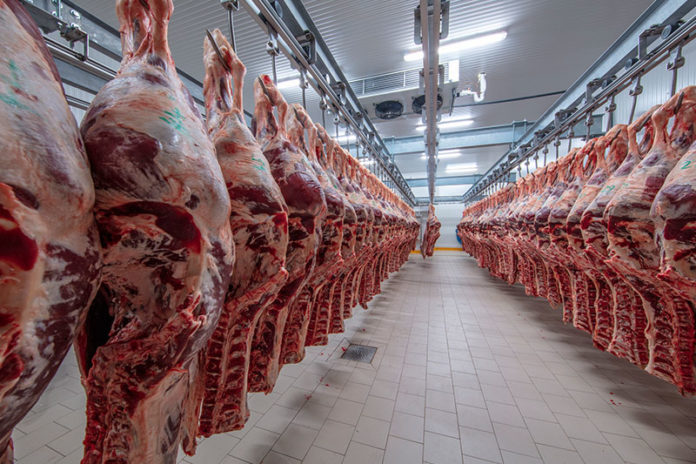The fervor around Britain’s official exit from the EU might have died down, but American farmers and English meat lovers should be celebrating for years to come. After all, Brexit has provided the opportunity to totally revamp a starving meat market.
Right now, exports to EU countries make up only a tiny percentage of all U.S. beef exports, while exports to countries like South Korea, which has a smaller population than the U.K., make up 20%. That means that not only could a new trade deal expand the dinner menu for those in the U.K., this potentially new market could also mean big business deals for U.S. beef and other meat producers.
In 1981, the EU banned the use of synthetic hormones in their cattle production, and then the import of hormone-treated beef in 1989, citing safety concerns for human consumption from these artificial enhancers. So, for decades, the U.S. has been trying to convince the EU to budge on its meat restrictions, because an overwhelming majority of meat producers in the U.S. use hormones, like estrogen, when raising their cattle, or feed them genetically-modified grain.
Non-GMO farmers, organic grass-fed cattle and hormone-free ranches certainly exist in the U.S. Just look at the source farm for any beef jerky packet from Whole Foods. Their farming style has been wildly successful within the U.S. because of organic and clean-eating food trends. And abroad, their products are even higher in demand, of course, because they’re the only farmers who have been able to export to most European countries. But the vast number of meat producers who have been boxed out of this market because of the ban would certainly jump at the first opportunity to be welcomed back in.
In 2009, the EU and the U.S. struck a compromise in light of the frustration the restrictions were causing. The two parties signed an official Memorandum of Understanding, meaning that if the EU agreed to open up to more trade, the United States would not challenge them too much on the beef restrictions.
A revised trade deal was then negotiated just last year, which guaranteed large increases in trade for non-hormone, or “high quality beef” trade. That meant no benefit to the average U.S. cattle rancher — but a massive buyer guarantee for the few non-GMO, hormone-free, speciality ranchers.
And although the United States won its case against the EU in the WTO that confirmed the EU’s “scientific reasons” for beef trade restrictions weren’t actually scientifically based, the U.S. decided to indulge the EU’s protectionist policy — at the expense of taxpayers and the vast majority of ranchers. Indeed, the U.S. has spent millions of tax dollars setting up inspection and certification processes in the Department of Agriculture to export “high-quality” beef with the EU.
It’s puzzling that after years of fighting the restrictions, the U.S. would capitulate like this, to the detriment of much of the cattle industry. It’s not fair to cattle farmers, especially since hormone-treated beef isn’t “low quality.” It’s simply produced in a different, yet equally safe, way. The U.S., then, ought to draft a new deal that benefits the entire industry.
There is an impending challenge coming from some British politicians who have expressed their intention to keep hormone-treated meats out of the U.K. market. But Brexit removed the U.K. from the EU and thus removed its beef market from any prior U.S.-EU agreements. So if Britain moves to prevent trade, they’d be violating the WTO membership agreement and could bring on a trade war with the United States.
In my travels to Italy last year, I had many delicious meals, but I noticed that the meat selection was profoundly lacking. Millions of Europeans don’t even know what they’re missing, because hormone-treated beef hasn’t been legal there for nearly 40 years. But that could all change for Britain, now that it has left the European Union. New meat trade deals with the U.K. can be the window for the rest of Europe to see how safe U.S. beef and other meat products are (and also how superior they are in taste, thanks to our ranchers’ rearing practices). Post-Brexit Britain and the U.S. ought to work with one another for the sake of European consumers and an enhanced trade relationship that would be a win-win for all parties involved.
Patricia Patnode is the Outreach Director at LoneConservative.com and is a contributor for Young Voices.






























